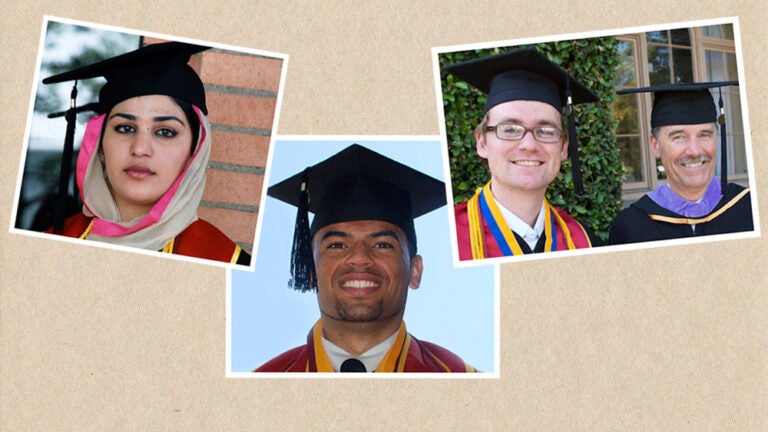
Pomp and Unusual Circumstance
Stationed in Tikrit, Iraq, Saddam Hussein’s birthplace 87 miles northwest of Baghdad, Apollo Emeka served as an intelligence analyst for the Army National Guard.
During his deployment, Emeka’s base was bombed several times. Once, a rocket missed him by a few feet. A fellow soldier in the same spot lost his legs in a subsequent explosion.
Four years later and halfway around the world, Emeka graduated Friday with a bachelor’s in sociology from USC College.
“Being in Iraq made me realize how much I don’t ever want to be powerless again,” said Emeka, 25, who earned an Army Commendation Medal for successfully tracking those responsible for the base bombings. “Because in Iraq, I felt powerless.
“I never want to be in a position where 30 people above me have complete control of my life.”

Apollo Emeka earned an Army Commendation Medal while serving in the Iraq war. Photo credit Pamela J. Johnson.
Raised in Seattle, Emeka joined the military after his mother died. Too distraught to study, he thought the guard’s disciplined structure one weekend per month would be uplifting. He joined in 2001, after Sept. 11, but never anticipated going to war.
When he returned, he attended Los Angeles City College and later his oldest brother, Amon Emeka, a professor of sociology in the College, suggested he apply to USC. During his tenure, he has been a Mellon Mays Undergraduate Fellow, USC Renaissance Scholar, Ronald E. McNair Scholar, Norman Topping Scholar, and a Mortar Board Honor Society member, to name a few achievements.
Emeka was also valedictorian during the USC Annual Black Graduation Ceremony.
“USC has been an incredible experience,” Emeka said. “If you have an idea or a passion at USC, you can see that idea come to fruition. Whether research, dance, acting, comedy, poetry, I’ve had the chance to do it all.”
—PJJ
Natasha Khan
A political science major, Natasha Khan closely monitored and analyzed her homeland Pakistan’s growing struggle against the Taliban and the resulting refugee crisis.
As the Muslim representative in USC’s Interfaith Council, she enjoyed lengthy debates about beliefs from atheism to Zoroastrianism.
She considers herself lucky. Although the educational status of Pakistani women is among the lowest in the world, her parents were educated and wanted their children to attend college regardless of gender.

Natasha Khan is considering returning to her homeland of Pakistan to teach in Chitral at all-girl schools targeted by the Taliban. “To fight against them,” she said, “we have to keep our hope alive.” Photo credit Pamela J. Johnson.
Khan is the first female in her family to travel to the United States for an education. For her father’s generation, it had been a Khan family tradition for sons to do so. At 18, she moved to Los Angeles not knowing exactly what to expect.
“I’m very attached to my own culture,” said Khan, 21, wearing a colorful, dupatta headscarf. “So it took me longer to get acclimated.”
She attended her Friday prayers at Masjid Omar ibn Al-Khattab, the mosque near USC on Exposition Boulevard, and excused herself from class for salah, the formal Islam prayer performed five times daily.
Each winter and summer break, she spent at home in Lahore. She was there when Benazir Bhutto, Pakistan’s former prime minister, was assassinated and riots broke out.
During that time, residents were cautioned that the water pipes may have been poisoned.
“It was that feeling you get when you feel you’re being closed in from all sides,” Kahn recalled with a shudder. “What can you do if you can’t use the water?”
After graduation, she plans to spend time with family in Lahore before attending law school in London. While home, she’s considering volunteering teaching in an all-girls school in Chitral, where the Taliban, enforcing a ban on female education, has been bombing such schools.
“Pakistan is in a bad spot right now, but we are resilient people,” she said. “These [Taliban] people are terrorists. Their goal is to get you to be afraid. If you are afraid, they have accomplished that. To fight against them, we have to keep our hope alive.”
—PJJ
David Gibson
Michael Gibson and son David received their USC diplomas after nine collective years of hard work and long nights of studying.
David earned his bachelor’s from USC College, where he majored in psychology and minored in neuroscience. Michael, a lawyer by day and student by night, received his master’s in historic preservation from the USC School of Architecture.
But with two simultaneous ceremonies on opposite ends of campus, the Gibson family was in a bind: Who cheers for whom?
The plan was to divide and conquer: Shawn Gibson, the Gibson family matriarch, headed to Alumni Park to cheer for David, while Michael’s aunt and other relatives camped out on Trousdale for the elder Gibson’s ceremony.

David Gibson, who majored in psychology and minored in neuroscience (left), and his father Michael, both graduated on Friday. David had many options, the elder Gibson said, “But USC was his top pick.” Photo credit Dietmar Quistrof.
Graduating together wasn’t planned. One year after Michael began classes at USC, his son joined him — but no pressure from dad.
“I told him that I was really impressed by the school,” Michael said. “He had a number of options, but USC was his top pick.”
As it turned out, USC was a perfect fit for David, who arrived at the College an undeclared freshman. With his many interests, he found that the interdisciplinary neuroscience program was a perfect way to let him explore a mix of subjects, all while learning about the brain and behavior.
Both Gibsons are following their dreams, with Michael expanding his practice to include preservation issues and the younger Gibson pursuing maritime law.
As the adage goes, like father like son.
—LW
Read more articles from USC College Magazine’s Spring/Summer 2009 issue.